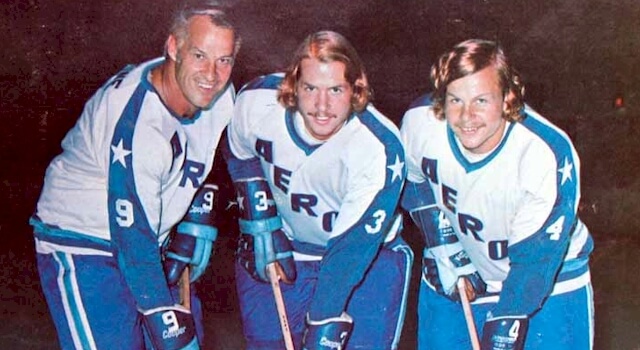
Gordie, Marty, and Mark Howe with the Houston Aeros in the mid-1970s.
How many times do you watch a sporting event and hear someone say so-and-so is a “future Hall of Famer?” Well, for seven years an actual Hall of Famer was on the ice competing in a major professional league, and as he did this Gordie Howe made history when it didn’t seem like he could make any more history.
Rather than play for a quickly deteriorating Detroit franchise, Howe retired in the fall of 1971 with one year left on his contract with the Red Wings. He spent a few years trying to act the part of a front office man, but that was never Gordie. He was a front line man. If he’d been a construction worker he would have been swinging a jackhammer. If he’d been a soldier, Howe would have been a sergeant, fighting right alongside his fellows. On a hockey team, Gordie Howe was meant to have a stick in his hand, the puck on his toe. Number nine belonged on the ice.
So, in 1973 when he was offered a chance to play in the World Hockey Association, the two-year old rival to the NHL, Howe penned his name on a contract. At 45 and already a member of the Hockey Hall of Fame, Howe slid a sweater over his broad shoulders to play for the Houston Aeros. His primary motivation was the chance to play on the same team as his two sons, 19-year old Marty and 18-year old Mark, both defensemen in their rookie years. In a way, Gordie’s two year absence from playing was merely a waiting period until his boys were ready to slash across the ice and slam elbows with their dad.
Gordie moved his family to Houston and quickly settled in to the Texas way of life. That comfort seemed to suit him well. In his first season with Houston his legs looked refreshed and his physical strength was what it had always been: amazing. At 45 he was as strong a skater as almost everyone in the league and he had no rivals for toughness.
“Gordie hasn’t lost anything from his game,” said Jim Watson, a former teammate of Howe’s on the Red Wings in the 1960s who played for the Los Angeles Sharks and Chicago Cougars in the WHA when Howe made his comeback.
As a “rookie” in the WHA, Howe scored 100 points in 70 games, earning the Most Valuable Player Award, which was, ironically, named after him. As a result, Howe wrested away the trophy from Bobby Hull, hockey’s best defenseman who had jumped to the WHA from the Chicago Blackhawks a few years earlier for an obscene (at the time) contract for more than $2 million. Gordie seemed to delight in traveling and playing with Marty and Mark, and he loved setting them up with passes.
“Dad will tell us to skate to a spot [on the ice] and wait for the puck,” Marty said. “A few seconds later the pass would be right there and we’d have a shot on the net.”
Howe’s presence awed his competition too. Often times opposing players would catch themselves watching Gordie and they were always fearful of receiving one his famed body checks. Howe was still a tough guy, though he bristled at the reputation. “He didn’t like when his teammates [on Houston] called him a ‘mean old man’,” Marty told The Sporting News in 1974. But Howe gladly benefited from the wide open ice his reputation afforded him. The Aeros won the WHA title in 1974, charging through the postseason with a 12-2 record. Howe was the perfect teammate and leader, dishing out 13 assists.
The following year Howe and Sons were even better, as they swept through the playoffs with a 12-1 record on the way to a second straight WHA title. Gordie had a similarly great season, scoring 99 points on 34 goals and 65 assists.
How good was the WHA? Well, they had Hull in his prime, and about three dozen other NHL players made the jump in the first three years. The league was smart not to try to compete too much in the same markets as their older rival. Instead they introduced teams to mid-level Canadian cities and U.S. cities that had never had top professional hockey. Many WHA owners had deep pockets and they gave their top stars big contracts. Howe made more money with Houston than he ever had with the Red Wings. The WHA also successfully challenged the NHL’s “reserve clause” which tied players to their teams for the first few years of their career without an option for free agency.
Still, the WHA was doomed to fail because too many of the owners were stretched too thin financially. Eventually, in 1979 the rival leagues agreed to a merger and four teams from the WHA were incorporated into the National Hockey League. By that time, Gordie and his sons had signed deals with the New England Whalers. After tallying up his six years in the WHA, Howe had put up 508 points on 174 goals and 334 assists in 419 games. He led his team to the Avco Cup (the WHA finals) in four of his six seasons, winning the one MVP award.
But Gordie wasn’t done, the 50-year old joined other WHA stars to sign contracts in the NHL after the merger and played one final season for Hartford in 1979-80, making a famous return to Detroit for the NHL All-Star Game where he received a seven-minute standing ovation that nearly brought the “mean old man” to tears.


